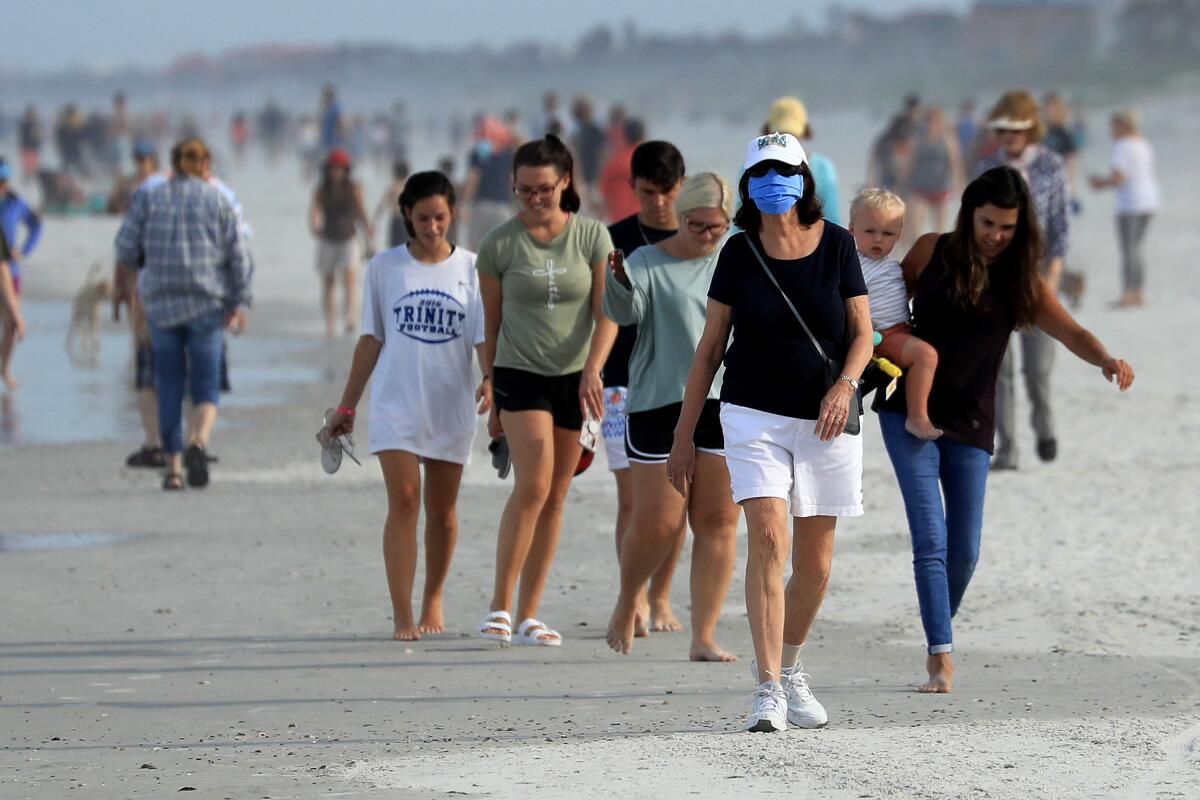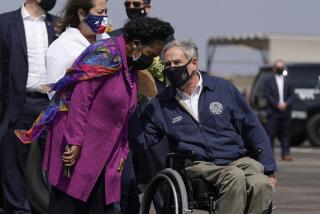Mayors resist Southern governors’ push to reopen despite coronavirus outbreak

- Share via
As several Southern governors began to reopen states shuttered by the coronavirus outbreak, some mayors and a senior Republican senator pushed back Tuesday, saying restrictions were being lifted too quickly.
“I am beyond disturbed,” Van R. Johnson, mayor of Savannah, Ga., said on CNN after Georgia Gov. Brian Kemp announced that gyms, hair and nail salons, tattoo parlors and bowling alleys could reopen Friday as long as customers obeyed social distancing guidelines.
Johnson called the governor’s order “reckless, premature and dangerous,” and asked businesses in his city to show “common sense” by staying closed until testing increased and infections declined.
Nearly 800 people have died of COVID-19 in Georgia since the outbreak began, including 85 on Monday — the worst day yet.
In Atlanta, Georgia’s biggest city, Mayor Keisha Lance Bottoms said she was “perplexed” by the governor’s decision. “I don’t see that it’s based on anything that’s logical,” she said.
Kemp joined his fellow Republican governors from South Carolina and Tennessee in announcing partial openings this week even as local authorities continued to grapple with COVID-19 deaths and called for more testing.
In South Carolina, Gov. Henry McMaster said that department stores, flea markets and florists could resume business Monday night and that the state’s beaches could reopen Tuesday.
John Tecklenburg, mayor of Charleston, S.C., said during a news conference Tuesday that his city would comply with McMaster’s order. But he said he was still concerned about testing capacity.
Sen. Lindsey Graham (R-S.C.) said he supported the new guidelines in his state but thought neighboring Georgia was “going too fast too soon.”
“We respect Georgia’s right to determine its own fate, but we are all in this together,” Graham tweeted. “What happens in Georgia will impact us in South Carolina.”
Asked about the dispute at a White House briefing, President Trump didn’t answer directly. “Two very capable people,” Trump said of Kemp and McMaster, adding that “we’ll find out” the impact of the changes.
“They’re going to be doing it safely... with tremendous passion,” Trump said broadly of reopening plans.
Dr. Deborah Birx, the White House coronavirus coordinator, suggested that Georgia was going against federal guidelines by lifting restrictions on businesses where people are required to sit close together.
“We were very clear” on the need to keep people at least six feet apart, she said, adding “I don’t know how” people would follow them while getting a tattoo, a haircut or a manicure.
“People are very creative,” she said.
In Ohio, Republican Gov. Mike DeWine said that the state would begin a partial reopening on May 1, and that he would announce specific plans on Thursday.
At a news conference, DeWine described it as a “high-wire act” and admitted that coronavirus infections could increase as a result.
At least 1,828 inmates at a state prison in Marion, Ohio, nearly three-fourths of the prison population, are infected.
In Tennessee, Gov. Bill Lee said the “vast majority” of businesses and services could reopen by May 1, but that people should still keep a healthy distance from one another to avoid spreading the virus.
“For the good of our state, social distancing must continue, but our economic shutdown cannot,” Lee said.
Trump has called for the quick reopening of state economies, although he told governors last week they should “call the shots” on how and when to carry that out to prevent a new outbreak.
Public health experts say most Americans should remain home until widespread testing is available to determine who is sick and who should be put in quarantine. Current testing is far from sufficient, they warn.
About 4 million people have been tested in the U.S. so far. But studies by the Rockefeller Foundation and Harvard University researchers say the country needs at least 3 million tests per week, or about triple the current capacity.
On Monday, Trump derided Maryland Gov. Larry Hogan, a Republican, after Hogan purchased half a million testing kits for his state from South Korea instead of waiting for assistance from the federal government.
Trump said Hogan, who heads the National Governors Assn., “needs to get a little knowledge.”
Hogan has expressed frustration for days with the Trump administration over his state’s struggle to obtain more testing equipment.
“If there were an easier way, we certainly would have taken it,” Hogan said Tuesday on MSNBC.
In New York and Detroit, two of the hardest-hit cities, officials have said the rate of infections may have peaked, although it may be months or longer before the economy recovers.
New York Gov. Andrew Cuomo said Tuesday that he expects upstate areas to reopen before New York City.
Cuomo met Trump at the White House, where he said they discussed the need for greater coronavirus testing.
“It has to be a real partnership” between states and the federal government, Cuomo said on MSNBC. He said Trump was “very open and understanding” of his request for more federal aid to states to increase testing.
In Florida, Republican Gov. Ron DeSantis, who faced early criticism for waiting weeks to issue a stay-at-home order in his state while beaches were packed in late March, declared victory on Tuesday, saying “we have flattened the curve.”
Florida saw fewer than 800 new reported cases of the coronavirus for the last three days, the lowest since late March when testing was more limited. At least 867 have died across the state.
White House guidelines say regions should see two weeks of declines before reopenings.
Louisiana also seemed to be turning the corner after drastic increases in infections and deaths. Democratic Gov. John Bel Edwards has asked for patience from residents before lifting restrictions but not until testing increased.
“We have to do what we have to do to save lives. We gotta get through this together, and I assure you, we will,” Edwards said.
In California, the number of infections appears to be leveling off even as death rates remain high.
Gov. Gavin Newsom, who has partnered with governors in Oregon and Washington to coordinate a regional recovery plan, is allowing limited easing of shutdown orders in certain areas.
Parks are reopening in Ventura County, for example. So are golf courses in Riverside County. But the governor said Tuesday that he would not allow communities to unilaterally lift stay-at-home orders.
New outbreaks of COVID-19 are also emerging, including in Massachusetts, which reported a 10% increase in hospitalizations last week. Officials say the crisis in the Chicago area is yet to reach its peak.
Major events also continued to be canceled. Organizers announced Tuesday that the Scripps National Spelling Bee, which has taken place since 1925 and was called off only once before — during World War II — will not take place this year.
More to Read
Sign up for Essential California
The most important California stories and recommendations in your inbox every morning.
You may occasionally receive promotional content from the Los Angeles Times.














